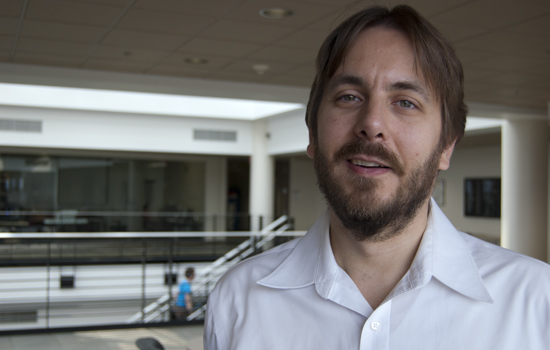Lecturer graduates alongside his students
Computer science lecturer Arthur Nunes-Harwitt will receive a Ph.D. in computing and information sciences—and cross the commencement stage this May with many of his students.
For the past three and a half years, professor Arthur Nunes-Harwitt has not only been handing out homework assignments, he’s also been receiving them.
This May, the computer science lecturer will cross the commencement stage as he graduates along with many of the undergraduate and graduate students that he has been teaching. He will receive a Ph.D. in computing and information sciences from RIT after completing the degree in late Fall 2014.
“It will be really nice to walk across that stage,” said Nunes-Harwitt. “My family will be cheering me on and I know they look forward to having me spend more time at home.”
The possibility of having a machine talk to a human to complete a task has intrigued Nunes-Harwitt since high school. He earned master’s degrees in both mathematics and computer science and has worked as a software engineer at the Learning, Research and Development Center in Pittsburgh and at MathWorks, developers of MATLAB and Simulink. He also taught at several other colleges before coming to RIT’s B. Thomas Golisano College of Computing and Information Sciences in 2007.
“Teaching wasn’t always the main goal for me—it was the opportunity to explore ideas with others,” said Nunes-Harwitt. “Completing a Ph.D. was a great way to continue doing that.”
At RIT, Nunes-Harwitt has taught introductory courses in Computer Science Theory and Foundations of Algorithms, among other courses. All the while, he was taking classes and conducting research for his dissertation.
“I remember teaching courses in Programming Language Concepts while working on interpreter and complier programming language research for my degree,” said Nunes-Harwitt. “That was a natural place for me to use what I was learning for my Ph.D., in the classroom with undergraduate students.”
After taking the Analysis of Algorithms course with Nunes-Harwitt, Connor Adsit, a computer science bachelor’s and master’s student, sought after the professor to take on an independent study class. Working under the professor, Adsit created a functional implementation and analysis of three approaches to solving the famous Boolean Satisfiability problem.
“Professor Nunes-Harwitt has an infectious love and passion for mathematics,” said Adsit, who is from Cooperstown, N.Y. “I actually only found out that he was a doctoral student earlier this year. I had always thought he was a tenured professor.”
Nunes-Harwitt plans to continue teaching and researching in RIT’s Department of Computer Science after walking in May.
